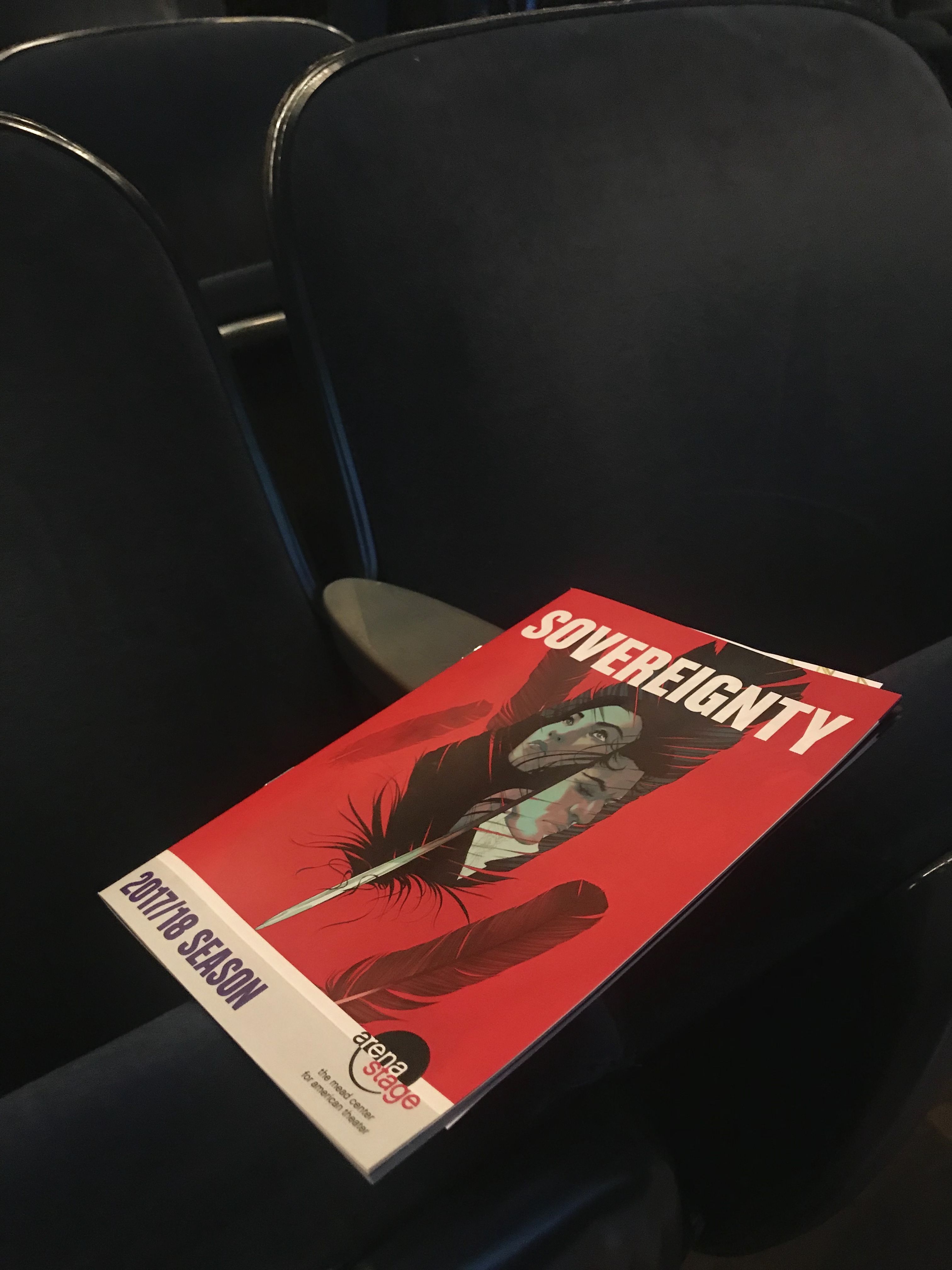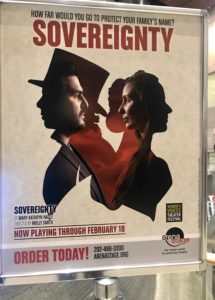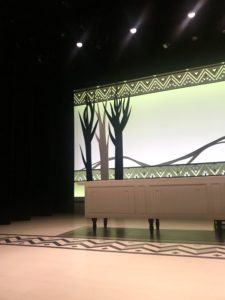Indigenous America Onstage in Washington DC

By: Sophia Schultz
While ARCH’s focus lies on working in post-war or conflict zones, since we’re based in the U.S., we’re also very interested in the very important challenge of protecting Native American heritage here at home. Over time our team has formed bonds with local groups, teachers, and artists, mainly in Santa Fe, New Mexico. We don’t have a specific project on the issue yet, but we’d certainly be more than open to one.
In the meantime I am happy I get to write about the play I recently attended, which seeks to raise awareness about Native American history.
“Sovereignty,” the play I recently attended at Arena Stage in Washington D.C., addresses the lack of knowledge and awareness on the part of most U.S. citizens about the history of Native Americans and their unique experience. Using the Cherokee Nation as an example, the struggle of Native tribes against the encroaching U.S. government is laid out in a whirlwind of historical events and current events; acted out on stage.
After a quick look at the playbill, a woman in the row behind me exclaimed: “It’s something I know nothing about,” thereby unwittingly underscoring the play’s contention.
This is the first time Arena Stage, founded in 1950, has produced a play by a Native American writer.(1) And indeed Mary Kathryn Nagle, a citizen of Cherokee Nation, activist lawyer, and writer of “Sovereignty,” points out “most theaters in the United States have never produced a play by a Native American playwright.”(2)
I also learned that the Supreme Court, since its establishment, has never accepted a clerk who was known to be of Native American heritage.(3) Indeed, I learned a great deal. In the very first scene, for example, the main character, activist lawyer Sarah Polson, explains a legal precedent to another character. It is an in-a-nutshell lesson on when the Supreme Court decided Oliphant v. Suquamish Indian Tribe (1978) which led to skyrocketing violence against Native women on tribal lands because tribal governments did not have the right to prosecute non-Indians for their crimes. This is a shocking fact that was not known to me, and I am glad to have learned of it. Yet, it is an example of a moment in which it felt like the play is inserting a fictitious history lesson that never took place but should have.
In my opinion the play’s script was a bit too ambitious. In trying to lay out the complexity of issues facing Native Americans (preservation of their heritage, family bonds, intermarriage, career choices, life on a reservation, legal battles, domestic violence) and to explain them in their historic context, while making sure no one is purely made a hero or a villain of, some dialogues suffered in the sense of becoming too “schoolmasterly.” (And now I wrote a too lengthy and ambitious sentence doing exactly that.)
But in its defense, the play was not aspiring to be a subtle poetic piece. It was full of energy, the heartfelt, sleeves rolled up energy that is common in activist and advocacy circles.The relatively fast-paced flow of the plot wasn’t lacking in humor either, despite the serious topics it addressed: impunity for criminals on Indian territories, domestic violence, history of slavery (the Cherokees were slave owners, too), family feuds etc. You could feel the passion and dedication of the characters in the play, who through their legal education try to make a difference for their people. From my seat in the front row, I could see the actors’ eyes light up or their agitated frowns. These are the “troublemakers” the world needs more of.
Everywhere in the world today, lawyers and activists take on governments to fight for minority rights. Native American history shows how in the past, speaking up could put you in severe danger. This play creates a stage on which the dramas and claims of past generations can be heard. And we are reminded that to this day, in too many countries, speaking up against land theft from indigenous communities, racial injustice, or on behalf of women’s rights or LGBT rights, to name just a few, means risking personal safety, imprisonment or worse.
The activist lawyer in the play was a figure one could easily connect and empathize with. She found her purpose in the here and now, but her decisions were based on the heroism she so admired in her ancestors. It’s the universal, seemingly never-ending struggle to stand up for the less privileged, the less heard. As artist Jenny Holzer famously put it: “Abuse of power comes as no surprise.”
A technique I really enjoyed was how the play switched between the historic time (around 1830s) and the present day/near future. This plot element was accelerated towards the end of the play. The pace of switching-between-times happened faster, became more abrupt, a very clever development as by this point the audience had become accustomed to this time-travel element. Interesting too was that most actors would take on roles in both epochs (the past and the present) which added to the feeling of these two time frames gradually merging. In its sped-up frequency one message became even more clear: In linking the past to the present, the historic weight and the importance of the issues addressed were brought to life in a powerful way. At one point Sarah Polson from the now was in the same room with Major Ridge from the past. In her red dress she froze during that scene until it was her turn again. The past and the present shared a stage, which intensified the feeling of how they connect with each other. And to the future.
Especially for people who work in the preservation of cultural heritage, as we do here at ARCH, this is something we hear often from the people who approach us: namely, how present and meaningful the past is for them in their daily lives. Reflecting on the role the endangered Cherokee language has for her and her community, the playwright, who included the language in her play, says, “truly, our sovereignty is our language, and we are indebted to those who speak and preserve it. Wado.”(4) When we talk to our Afghan counterparts regarding our vision to rebuild the Bamiyan Buddhas, they consistently express their enormous pride in these colossal statues that their ancestors built for their valley. They feel a very immediate and personal sense of ownership and attachment to these monuments. I’m sure the Hazara people of the Bamiyan Valley would relate very easily to the strong attachment that Southwestern Native American tribes feel for Bears Ears National Monument, to name just an example.
What I take away from the play, is on the one hand the determination of a people to keep their heritage alive, and on the other hand the appreciation for all the indefatigable activists around the world, risking discord with their families, with their hometowns, their financial security (losing their job), backlash from more powerful people opposing them (risking defamation), arrests etc. They fight to improve the lives of their kinfolk, and have to make very hard decisions.
The director of the play, Molly Smith, calls it a “provocative play about America’s first people.”(5) I had to think about her describing it as provocative as the play seemed quite matter-of-fact and balanced to me. A lesson from the past most of us have missed out on, cleverly brought to life. Perhaps the simple fact of staging the play in the national capital could be seen as provocative as it’s groundbreaking that a Native American playwright’s work, one that focuses on her people’s centuries old struggle, made it onstage. Here, the less heard stories of “the underdog”, of the minorities that usually weren’t the first ones filling the white pages of history books, are given the space to be played out; here onstage, with a new voice, these stories are experienced by today’s audience. Isn’t that something we shouldn’t be provoked by but rather demand more of?
*
Would you or someone you know like to volunteer some of their time to look into endangered languages, forgotten customs or celebrated cultural achievements? → info@www.cherylbenard.com.
Another very effective way of supporting us and the issues you care about is by donating to our nonprofit. Thank you.
Sources:
1) From the playbill, p. 4
2) Quote taken from the playbill, p. 9
3) Mentioned in the play, and also in this source “Supreme Court clerks are overwhelmingly white and male. Just like 20 years ago.”, Tony Mauro, USA Today, January 8, 2018: https://www.usatoday.com/story/opinion/2018/01/08/supreme-court-clerks-overwhelmingly-white-male-just-like-20-years-ago-tony-mauro-column/965945001/
4) Quote taken from the playbill, p. 9. Wado means Thank You. Check out “Cherokee Word of the Week” here: https://www.youtube.com/watch?v=SIENXO2ax_o
5) Quote taken from the playbill, p. 4



